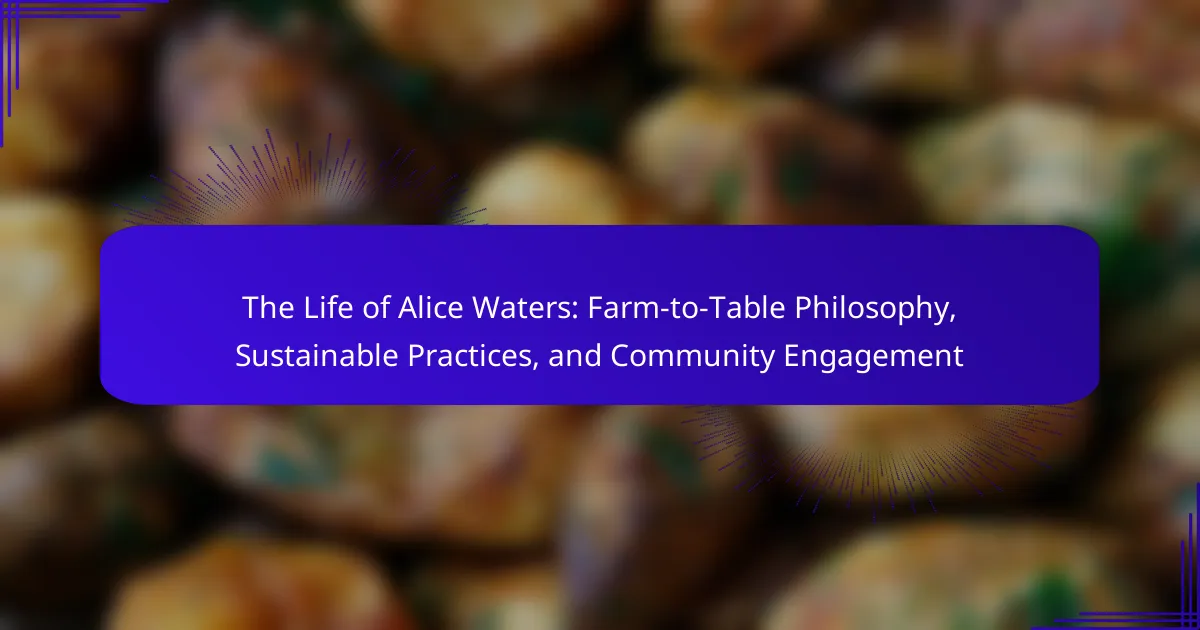
What is the life and philosophy of Alice Waters?
Alice Waters is a renowned chef and food activist. She is the founder of Chez Panisse, a restaurant in Berkeley, California. Waters is a pioneer of the farm-to-table movement. Her philosophy centers on using fresh, seasonal, and sustainably sourced ingredients. She emphasizes the importance of local agriculture and community engagement. Waters believes in educating consumers about food origins. Her work has influenced culinary practices worldwide. She has received numerous awards for her contributions to food culture.
How did Alice Waters develop her farm-to-table philosophy?
Alice Waters developed her farm-to-table philosophy through her experiences in France. She was inspired by the fresh, local ingredients used in French cuisine. This led her to prioritize seasonal produce in her cooking. Waters opened Chez Panisse in 1971, emphasizing a menu based on local farms. She built relationships with local farmers to ensure quality ingredients. Her philosophy promotes sustainability and environmental responsibility. Waters’ approach has influenced chefs and food movements globally. Her work has been recognized with numerous awards, solidifying her impact on American cuisine.
What experiences influenced Alice Waters’ culinary journey?
Alice Waters’ culinary journey was influenced by her experiences in France. She studied at the University of California, Berkeley, where she developed an appreciation for fresh ingredients. Time spent in Paris exposed her to the local markets and the concept of seasonal cooking. These experiences shaped her belief in the importance of using local, organic produce. Waters later opened Chez Panisse in 1971, emphasizing a farm-to-table approach. Her travels and education inspired her commitment to sustainable practices. She became a pioneer in advocating for slow food and community engagement. Waters’ journey highlights the impact of cultural experiences on culinary philosophy.
How did her travels shape her understanding of food and sustainability?
Her travels significantly influenced her understanding of food and sustainability. Exposure to diverse agricultural practices broadened her perspective on local food systems. In France, she learned the importance of seasonal ingredients. This experience highlighted the connection between food quality and sustainable farming. Interactions with local farmers emphasized the value of community engagement in food sourcing. She observed how traditional methods preserved the environment. These insights shaped her philosophy of promoting organic and sustainable practices. Ultimately, her travels reinforced the need for a farm-to-table approach in her culinary endeavors.
What are the key principles of Alice Waters’ sustainable practices?
Alice Waters’ sustainable practices are centered around local sourcing, seasonal ingredients, and organic farming. She emphasizes the importance of supporting local farmers and communities. This approach reduces carbon footprints associated with transportation. Waters advocates for the use of fresh, organic produce to enhance health and flavor. She promotes education about food and its origins in schools. Waters’ commitment to sustainability is evident in her restaurant, Chez Panisse, which features a menu that changes daily based on local availability. Her practices have influenced a broader movement toward sustainable agriculture and dining.
How does Alice Waters define sustainability in food systems?
Alice Waters defines sustainability in food systems as a holistic approach that prioritizes environmental health, social equity, and economic viability. She emphasizes the importance of locally sourced, organic ingredients. Waters advocates for farming practices that enhance biodiversity and soil health. She believes sustainable food systems should support local economies and communities. Additionally, she promotes education about food and cooking as essential to fostering sustainable practices. Her philosophy highlights the interconnectedness of food, culture, and the environment. Waters’ initiatives, such as the Edible Schoolyard project, demonstrate her commitment to these principles.
What methods does she advocate for sustainable agriculture?
Alice Waters advocates for organic farming, permaculture, and local sourcing in sustainable agriculture. She emphasizes the importance of growing food without synthetic pesticides or fertilizers. Organic practices enhance soil health and biodiversity. Permaculture focuses on creating self-sustaining ecosystems. Local sourcing reduces carbon footprints and supports community economies. Waters also promotes seasonal eating, encouraging consumers to choose foods that are in season. This method fosters a connection between people and the land. Her restaurant, Chez Panisse, exemplifies these practices by sourcing ingredients from local farmers. Through education and advocacy, she inspires others to adopt sustainable methods.
Why is community engagement important in Alice Waters’ work?
Community engagement is crucial in Alice Waters’ work because it fosters a connection between local food systems and the community. Waters emphasizes the importance of understanding where food comes from. This understanding promotes sustainable agricultural practices. Engaging the community helps to educate individuals about nutrition and healthy eating. It also encourages support for local farmers and markets. Waters’ initiatives, such as the Edible Schoolyard Project, demonstrate the impact of hands-on learning. This project integrates gardening and cooking into school curricula. It empowers students to appreciate food and its origins. Such engagement creates a ripple effect, leading to healthier communities and stronger local economies.
How has Alice Waters involved local communities in her initiatives?
Alice Waters has involved local communities through various initiatives focused on sustainable food practices. She founded the Edible Schoolyard project, which integrates gardening and cooking into school curriculums. This project engages students and their families in hands-on learning about food systems. Waters also collaborates with local farmers to promote seasonal and organic produce. Her restaurant, Chez Panisse, emphasizes sourcing ingredients from nearby farms, supporting the local economy. Additionally, she advocates for food justice and access to healthy food in underserved communities. Through these efforts, Waters fosters community involvement and awareness of sustainable practices.
What impact has her work had on community health and education?
Alice Waters’ work has significantly improved community health and education. Her farm-to-table philosophy promotes fresh, organic food consumption. This shift has led to better nutritional choices among community members. Educational programs initiated by Waters emphasize sustainable agriculture practices. These programs teach children about healthy eating and food sources. They also encourage hands-on gardening experiences in schools. Studies show that students engaged in such programs have increased fruit and vegetable intake. Additionally, her advocacy for local food systems supports community economies. Overall, her contributions foster healthier lifestyles and informed food choices in communities.
How does Alice Waters promote the farm-to-table movement?
Alice Waters promotes the farm-to-table movement through her influential restaurant, Chez Panisse, which emphasizes local and organic ingredients. She advocates for sustainable agriculture and supports local farmers by sourcing fresh produce directly from them. Waters also founded the Edible Schoolyard Project, which teaches children about food, gardening, and healthy eating. This initiative connects students with the source of their food, reinforcing the importance of local sourcing. Additionally, she has authored books that highlight the benefits of seasonal cooking and the farm-to-table philosophy. Waters’ efforts have inspired a broader movement towards sustainable food practices across the country.
What challenges has Alice Waters faced in her advocacy for sustainable practices?
Alice Waters has faced numerous challenges in her advocacy for sustainable practices. One significant challenge is resistance from conventional agricultural businesses. These entities often prioritize profit over sustainable methods. Another challenge is the lack of awareness among consumers regarding the benefits of sustainable food practices. Many people are unaware of how food choices impact health and the environment. Additionally, Waters has encountered political obstacles, such as insufficient government support for local farms. This lack of support can hinder the growth of sustainable agriculture initiatives. Furthermore, she has faced criticism for promoting organic food, which some view as elitist. Despite these challenges, Waters continues to influence the food movement through education and community engagement.
How has she addressed resistance to change in the food industry?
Alice Waters has addressed resistance to change in the food industry by promoting education and awareness. She established the Edible Schoolyard project to teach children about sustainable food practices. This initiative connects students with local farms and gardens. Waters advocates for the benefits of organic farming and seasonal eating. She emphasizes the importance of community engagement in food choices. Her restaurant, Chez Panisse, serves as a model for farm-to-table dining. This approach has influenced other chefs and restaurateurs. Waters’ efforts have sparked a broader movement towards sustainable food systems.
What lessons can be learned from her experiences in promoting sustainability?
Alice Waters’ experiences in promoting sustainability highlight the importance of local sourcing and community engagement. She emphasizes that connecting with local farmers enhances food quality and supports the local economy. Waters advocates for seasonal eating, which reduces environmental impact and promotes biodiversity. Her commitment to education demonstrates that teaching sustainable practices can inspire future generations. Additionally, her work shows that creating a strong community around food fosters a culture of sustainability. These lessons underscore the value of collaboration, education, and localism in sustainability efforts.
What practical tips can we adopt from Alice Waters’ philosophy?
Adopting Alice Waters’ philosophy involves focusing on seasonal, local ingredients. Prioritize fresh produce from nearby farms. This supports local economies and reduces carbon footprints. Practice cooking with simplicity to highlight natural flavors. Emphasize sustainability in food choices and minimize waste. Engage with community gardens to foster connections and education about food. Advocate for food education in schools to promote healthy eating habits. These practices align with Waters’ commitment to a sustainable food system.
How can individuals incorporate farm-to-table practices in their own lives?
Individuals can incorporate farm-to-table practices by sourcing food directly from local farms. This supports local agriculture and reduces carbon footprints. Visiting farmers’ markets is an effective way to find fresh, seasonal produce. Many communities have programs that connect consumers with local farmers. Joining a community-supported agriculture (CSA) program allows individuals to receive regular deliveries of farm-fresh goods. Cooking at home with these ingredients fosters a deeper connection to food. Educating oneself about seasonal produce enhances meal planning. Engaging in local food initiatives promotes sustainable practices within the community.
What are the benefits of supporting local food systems?
Supporting local food systems boosts local economies and enhances community resilience. Local food systems create jobs and keep money circulating within the community. According to the USDA, every dollar spent on local food generates an estimated $1.76 for the local economy. Supporting local agriculture reduces transportation costs and carbon emissions. This practice also encourages biodiversity by promoting diverse crops. Additionally, local food tends to be fresher and more nutritious. Research shows that local produce retains more nutrients due to shorter time from farm to table. Supporting local food systems fosters community connections and strengthens social ties.
Alice Waters is a prominent chef and food activist known for founding Chez Panisse and pioneering the farm-to-table movement. Her philosophy emphasizes the use of fresh, seasonal, and sustainably sourced ingredients, advocating for local agriculture and community engagement. The article explores how her experiences in France influenced her culinary journey and shaped her commitment to sustainable practices. It also highlights her initiatives, such as the Edible Schoolyard project, which promote education about food origins and healthy eating. Additionally, the article discusses the challenges she faced in advocating for sustainable practices and offers practical tips for individuals to incorporate farm-to-table principles into their lives.
